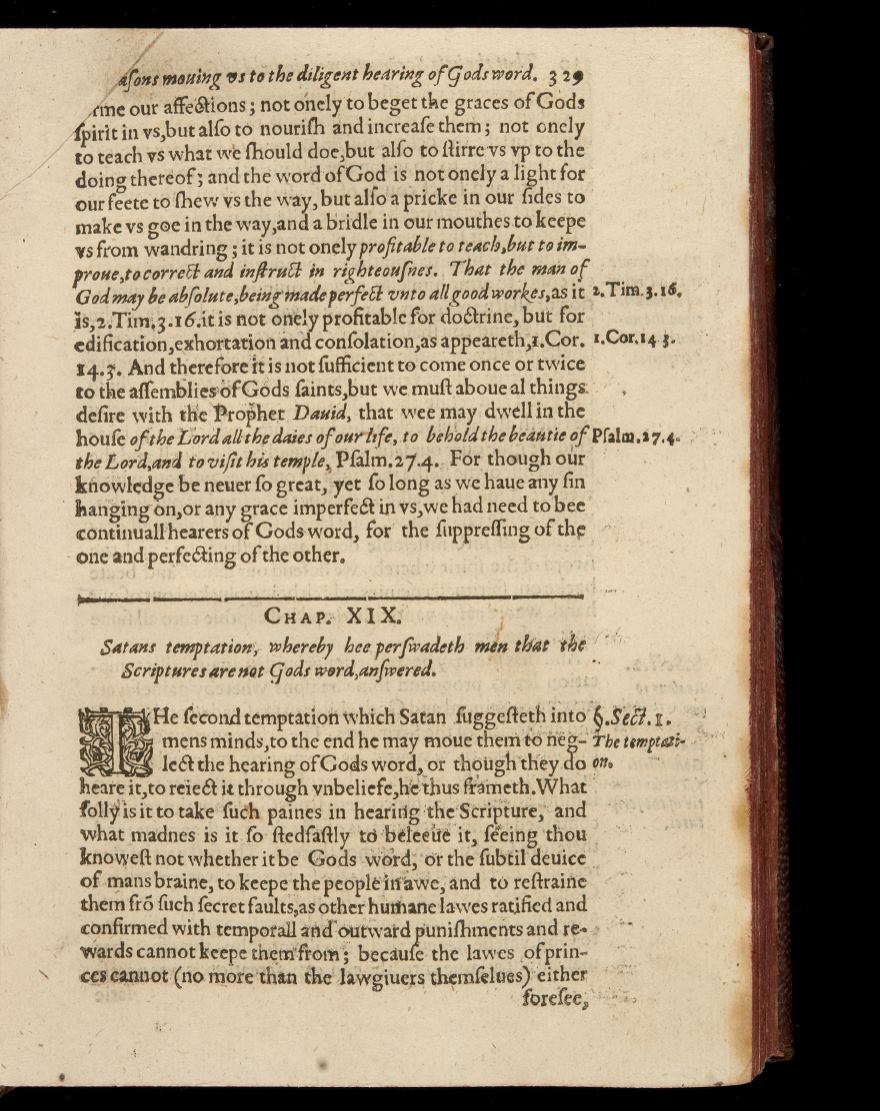

afons nsouivg
vs
to
the diligent hearing
of
Çods word,
329
.cme
our affections;
not
onely
to
beget
the
graces
of
Gods
(pint
in
vs,but
allo
to nourifh
and increafe them
;
not
onely
to
teach
vs
what
we
fhould
doe,but
alto
to
flirre-vs vp
to
the
doing
thereof;
and the word
ofGod
is
not
onely
a
light
for
our
feete
to
Phew vs
the way,
but
alto
a
pricke
in
our
fides
to
make
vs
goe
in the
way,and
a
bridle
in
our mouthes
to
keepe
vs
from
wandring
;
it
is
not
onely
profitable
to
reach,but
to
im-
proue,tocorre1
and
infrua
in
riçhteoufnes.
That
the man
or
God
may be
abfolure,being'made
perfect
vnto
all
good'orkes,as
it .Tim
3.
¡6,
ìïs,2.Tim,3.i 6.it
is
not
onely profitable for
doctrine,
but
for
edification,exhortation
and confolation,as appeareth,a.Cor,
I.Cor.i
;.
4.3'.
And therefore it
is
not
fufficient
to
come once or
twice
to
the
affemblies
öfGods
faints,but
we
mull aboue
al
things
.
delire
with the
Prophet
Dauid,
that
wee may dwell in
the
bottle
of
the
Lord
all the
daies
of
our
life,
to
behold
the
beautieof
pfaln.27,f
theLord,and
tow/it
his temple,
Pfalm.27.4.
For
though
our
knowledge be
neuer
fo
great,
yet
fo
long
as
we haue
any fin
hanging
on,or
any grace
imperfe6
in vs,we
had need
to bee
continual'
hearers
of
Gods word,
for
the
fiipprefling
of
the
one
and perfecting
of
the
other.
CHAP.
XIX.
Satans
temptation,
whereby hee
perfradeth
men
that
Me
Scriptures
are
not
Gods
cvord,anfrered,
T2;
He
fecoicitemptation
which
Satan
fuggefleth
into
§,Secs.
a.
4,..t
Iv
mens
minds,to the
end
he
may
moue them
to
new-
The
tempte2i-
k,
i.
lea
the
hearing
ofGods word,
or
though
they do
ono
heare
it,to
reiea
it
through
vnbeliefe,he thus
frameth.What
folly is
it
to
take
fuch paines in
hearing
the
Scripture,
and
what
madnes
is
it
fo
fledfaflly
to
beleeue
it,
f
Bing
thou
knowefl not whether
it be Gods word,
or the fubtil deuice
of
mans
braine, to
keepe
the
people in
awe,
and
to
reflraine
them
frô
fuch
fecret faults,as
other
humane lawes
ratified
and
confirmedwith temporal'
and'outward
punifhments and
re..
wards cannot
keepe
them'frot
;
becaufe
the
lawes
ofprin-
ces
cannot (no more than
the
lawgiuers
themfelnes)
either
forcfee,

















